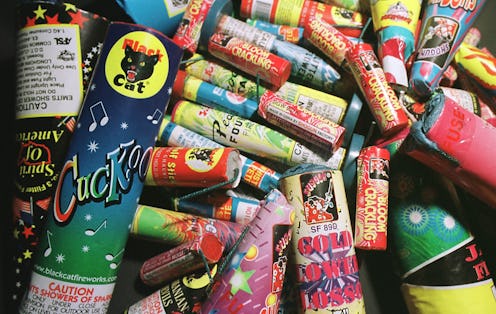Life
Are Fireworks Legal In Your State?
As the Fourth of July approaches, you’re probably wondering about something important — are fireworks legal in your state? Or do you live in a state that hates fun? Aside from celebrating democracy and the good ol’ red, white, and blue, Independence Day is all about fireworks. And I’m not talking about the big fireworks spectaculars getting shot off from barges and bridges. I mean the little fireworks most of us will be able to enjoy from our backyards this July 4.
I grew up in a pretty rural area, so having fireworks on Fourth of July wasn’t a super big deal. And I’ve definitely shot off a few Roman candles while riding dirt bikes in the desert. But since my home state of California has been known to be a pretty dry place — this is even before our horrific draught — fireworks haven’t always been welcome. This is where the difference between county and state laws come in. So even if you think your state is cool with fireworks, you should still check with your local county's policies regarding consumer fireworks.
But first and foremost, remember that safety is the most important thing when handling fireworks. They may be small, but those suckers can put an eye out as easy as the big ones!
1. Before we get to the laws… what's considered a firework?
According to the Consumer Product Safety Commission, the majority of states allow for the purchase of consumer fireworks and novelty items. Consumer fireworks include shell and mortar, Roman candles, rockets, sparklers, and any other fireworks with less than 50 milligrams of gunpowder. Novelty fireworks, which tend to be more widely available, include snakes, ground spinners, fountains, party poppers, and others.
2. So, does your state allow fireworks?
Washington D.C., Puerto Rico, and 40 states allow for the purchase and use of some or all types of consumer fireworks. You can see the full list on the CPSC’s website. Five states — Illinois, Iowa, Maine, Ohio, and Vermont — allow only sparklers and/or other novelty fireworks, and Arizona only allows novelties. The remaining states — Delaware, Massachusetts, New Jersey, and New York — have banned any and all consumer fireworks. But, as I mentioned, local laws may differ from state and federal laws, so you will want to check to make sure you’re all clear.
3. Now that you’re good to go (or maybe not), what’s next?
Well, you have to go about actually buying the fireworks. In some states, you can just buy boxes of novelty fireworks at Wal-Mart, and in others you have to go to temporary fireworks stands located outside your county limits. But, again, check with your local laws. Just because you can buy fireworks near you doesn’t mean you can set them off.
4. Let’s talk about safety
So, a sparkler or a snake might not seem like a dangerous weapon, but they can be. Here are a few good safety tips from the CPSC:
- Always stand at a safe distance after lighting a firework
- Keep fireworks out of the hands of children (duh)
- Set fireworks off outdoors and away from dry brush, buildings, etc.
- If a firework doesn’t light or ignite, do not try to relight. Soak it in water, and throw it away
- Never put your body over a firework while lighting it
- Don’t make homemade fireworks (another, duh)
The CPSC estimates that around 11,400 people were treated for fireworks-related injuries in 2013, so don’t be stupid. Be safe!
Images: Giphy (4)
